Text
My spring 2024 cdrama/cmovie/cvariety updates

I can't believe it's already been over 6 months since my last watching updates post! I've been watching more movies, and I'll also mention a couple variety shows, so it's not just cdramas.
Shows/series:
Some of these were mentioned as “currently watching” in my previous post.
《不良执念清除师》 Oh No! Here Comes Trouble
A young man learns to use his supernatural calligraphy powers to help strange beings, with help from his frenemy and a young police officer. This show was like a breath of fresh air and very humorous. That being said, it was difficult to follow all the storylines. If you're going to watch it, I think you should binge it if possible.
Content warning: Death, gore
《此时此刻》 At the Moment
An anthology of quirky pandemic love stories, not all with happy endings. It's kind of like Love Actually in that the characters are connected across stories. Initially I didn't plan to watch because of the pandemic through line—I thought it would bum me out. But it didn't, actually. My favorite episode was Head of the Family.
Content warning: Unhealthy relationships, sex and nudity
《隐秘的角落》 The Bad Kids
Three kids accidentally film a murder and try to blackmail the killer, resulting in devastating consequences. I felt the first half of this show was more captivating than the second half—the second half went a bit overboard IMO. Apparently the original novel is way darker so…! But I still recommend it wholeheartedly.
Content warning: Death and violence (but not graphic)
《沉默的真相》 The Long Night
The murder of a disgraced prosecutor seems like an open-and-shut case, but his past reveals a much more complicated story. This show masterfully weaves together three different timelines. I was so confused after the first episode, but it all made sense in the end. I don't recommend binge watching it—I regretted doing so.
Content warning: Violence, death, sexual assault
《双镜》 Couple of Mirrors
A young woman's personal and professional lives are turned upside down, and she befriends a mysterious woman with a dark past. You have to suspend your disbelief to enjoy this show. There was a ridiculous number of car accidents! It's a GL drama, but if I hadn't know that, I don't think I would have noticed until the end.
Content warning: Death, violence
Variety/reality:
《披荆斩棘的哥哥》 Call Me by Fire
In the past I didn't include variety shows, but this time I thought why not? I finally finished all 3 seasons of this show, the male spinoff of 《乘风破浪的姐姐》 Sisters Who Make Waves. It's similar to an idol survival show, but instead of trainees, the contestants are established celebrities. The sets are always amazing, and I might have enjoyed this show more than 《乘风破浪》 honestly!
Movies:
《家庭简史》 Brief History of a Family
The description of this movie sounded dull, but I ended up enjoying it a lot! I've seen reviews compare it to Parasite and Saltburn. There is definitely some similarity–it's about a well-off family that takes in a mysterious, quiet boy–but the takeaway of this film is very different. It leaves a lot of room for ambiguity.
《流浪地球》 The Wandering Earth
After being on my watchlist for years, I finally got around to seeing this movie. I knew the basic premise: humanity bands together to move Earth away from the expanding sun. I wasn't expecting that it would focus on one family, which gave the movie a more personal feel. I enjoyed it despite not being a huge sci-fi person.
Content warning: Death
《美国女孩》 American Girl
A family moves back to Taiwan for their mother's cancer treatment after several years in the US, and the eldest daughter struggles to adapt. It's set during the SARS outbreak, but I don't remember that being very prominent. This movie was quite bleak and bummed me out. And I found the ending rather abrupt. It wasn't for me I think.
Content warning: Illness, disease outbreak
《你好,李焕英》 Hi, Mom
This movie was super popular when it came out. It's about a woman who gets transported back in time and meets her mother (who is young and childless at this point). At first I was confused about where the movie was going—it didn't seem to be building to much. But it had a heartwarming and touching ending.
Content warning: Death
《周处除三害》 The Pig, The Snake and The Pigeon
After seeing a lot of buzz about this movie online, I had to check it out. It follows a terminally ill hitman who learns he is the third most wanted criminal in Taiwan and decides to kill the two criminals ranking above him. Despite this, the main character is actually pretty likable. I enjoyed the movie despite the violence.
Content warning: Excessive violence, death, sexual assault
Currently watching:
《火星情报局》 Mars Intelligence Agency
This is a variety show. The cast consists of celebrities who take turns telling funny stories and making jokes. I started watching because my favorite singer 薛之谦 is a cast member. I was unsure about the concept at first, but honestly it's really entertaining!
《摩天大楼》 A Murderous Affair in Horizon Tower
I finally started this show, which has been on my watchlist for a while. I'm only 2 episodes in—so far it's mostly been about the past of the titular murder victim. I'm not yet sure what direction the show will go in, but I'm excited to find out.
Abandoning:
《你的孩子不是你的孩子》 On Children
I got through 3 out of 5 episodes before abandoning this show. Each episode is the length of a movie, so they drag on. But I totally understand why episode 2, Child of the Cat, was nominated for and won so many awards. The acting was really strong.
《汉化日记》 God Troubles Me
I wanted to try watching a 动画, but after a few episodes, I wasn't feeling this one. Each episode is quite short, so it's an easy watch. I think it just wasn't for me.
On my watchlist:
《漫长的季节》 The Long Season
《尘封十三载》 Thirteen Years of Dust
I'm trying to be better about content warnings. But please note, I only included them for things I finished watching, not things I'm currently watching or abandoning.
#my watchlist#cdrama#cdramas#chinese drama#chinese dramas#variety show#taiwanese drama#taiwanese movie#chinese movie#chinese#mandarin#mandarin chinese#chinese language#studyblr#langblr#chinese langblr#mandarin langblr#languageblr
34 notes
·
View notes
Text
Another 50+ crime, suspense, & mystery cdrama vocab words

This is a follow-up to my post from last summer sharing 50+ fundamental vocab words. I just finished 《隐秘的角落》 The Bad Kids and 《沉默的真相》 The Long Night, plus I watched 《猎罪图鉴》 Under the Skin last year. So let's take a deeper dive with 50+ more words!
Definitions are adapted from MDBG. I tried adding standard 国语 pronunciation too but might have overlooked some. 请多多指教!
Format: 简体 | 繁体 读音 | 台湾读音
(Simp.) | (trad.) (pronunciation) | (Taiwan pronunciation)
The crime
主谋 | 主謀 zhǔmóu - mastermind / ringleader
共犯 gòngfàn - accomplice
杀人犯 | 殺人犯 shārénfàn - murderer
凶杀 | 兇殺 xiōngshā - to murder / assassination
当场 | 當場 dāngchǎng - at the scene / on the spot
勒死 lēisǐ - to strangle
死者 sǐzhě - the dead / the deceased
案发 | 案發 ànfā - (of a crime) to occur or take place
出事 chūshì - to have an accident / to meet with a mishap
遇难 | 遇難 yùnàn - to perish / to be killed
逃跑 táopǎo - to flee from smth / to run away / to escape
包庇 bāobì - to shield / to harbor / to cover up
勒索 lèsuǒ - to blackmail / to extort
The evidence
罪证 | 罪證 zuìzhèng - proof of guilt / evidence of a crime
佐证 | 佐證 zuǒzhèng - evidence / proof / corroboration
证明 | 證明 zhèngmíng - to prove / to confirm the truth of
目击者 | 目擊者 mùjīzhě | mùjízhě - eyewitness
人证 | 人證 rénzhèng - witness testimony
物证 | 物證 wùzhèng - material evidence
作证 | 作證 zuòzhèng - to testify / to serve as evidence
销毁 | 銷毀 xiāohuǐ - to destroy (by melting or burning)
死因 sǐyīn - cause of death
解剖 jiěpōu | jiěpǒu - to dissect / to autopsy
血迹 | 血跡 xuèjì | xiějī - bloodstain
指纹 | 指紋 zhǐwén - fingerprint
遗物 | 遺物 yíwù - remnant
The breakthrough
吻合 wěnhé - to be identical with / to agree with
直觉 | 直覺 zhíjué - intuition
突破 tūpò | túpò - to break through / to make a breakthrough
疑点 | 疑點 yídiǎn - a doubtful point
异常 | 異常 yìcháng - unusual / abnormal
意图 | 意圖 yìtú - intent / intention / to intend
推断 | 推斷 tuīduàn - to infer / to deduce / to extrapolate
质疑 | 質疑 zhìyí | zhíyí - to call into question
站住 zhànzhù - to stop / to halt
住手 zhùshǒu - to stop / to stay one's hand
口供 kǒugòng | kǒugōng - oral confession / statement / deposition
The truth
如实 | 如實 rúshí - truthfully / according to the facts
实情 | 實情 shíqíng - the actual situation / the truth
坦白 tǎnbái - honest / forthcoming / to confess
大白 dàbái - to be revealed / to come out (of the truth)
开脱 | 開脫 kāituō - to absolve / to exonerate
翻案 fān'àn - to reverse a verdict
清白 qīngbái - pure / innocent
无辜 | 無辜 wúgū - innocent / innocence / not guilty
不在场证明 | 不在場證明 bú zàichǎng zhèngmíng - alibi
放走 fàngzǒu - to release / to set free
The system
法官 fǎguān - judge (in court)
检察官 | 檢察官 jiǎncháguān - public prosecutor
看守所 kānshǒusuǒ - detention center
公安局 gōng'ānjú - public security bureau / police department
派出所 pàichūsuǒ - local police station
法医 | 法醫 fǎyī - forensic investigator / forensic detective
制服 zhìfú - to subdue / to check / to bring under control
配合 pèihé - to cooperate with
传唤 | 傳喚 chuánhuàn - a summons (to the police) / subpoena
布控 bùkòng - to deploy surveillance / to put under surveillance
举报 | 舉報 jǔbào - to report (to the police)
出警 chūjǐng - to dispatch police to the scene
#vocab list#chinese#mandarin#mandarin chinese#chinese language#studyblr#langblr#learning languages#language learning#chinese langblr#mandarin langblr#languageblr#cdrama#cdramas#chinese drama#chinese dramas
67 notes
·
View notes
Text
Guessing the pronunciation of unfamiliar characters
No matter how many characters I know, there will always be unfamiliar ones to learn. I usually try to guess the pronunciation before consulting a dictionary. I'm an OK guesser by now, but here are 7 guesses that didn't land.
(1)绯 | 緋
My guess: pái
Actual: fēi
Meaning: dark red / purple silk
Spotted in: 绯红 | 緋紅 fēihóng - crimson / scarlet
I must have been thinking of 排 and 徘, both pronounced pái. But I should have guessed fēi because there are so many fēis: 啡菲扉霏.
(2)戮
My guess: chuō
Actual: lù
Meaning: to kill
Spotted in: 杀戮 | 殺戮 shālù - to massacre / to slaughter
At a first glance 戮 looks super similar to 戳 chuō. I might not haved even noticed the difference without my glasses on!
(3)慑 | 懾
My guess: niè
Actual: shè
Meaning: afraid / be feared / to fear / to frighten / to intimidate
Spotted in: 震慑 | 震懾 zhènshè - to awe / to intimidate
I guessed niè due to the similar characters 蹑 and 镊, both pronounced niè. 摄 shè is more common but totally slipped my mind!
(4)皙
My guess: xiū
Actual: xī
Meaning: white / variant of 晰
Spotted in: 白皙 báixī - (of complexion or skin) fair and clear
I really don't know why I guessed xiū. I can't think of any characters pronounced xiu that look similar to 皙! It's a mystery.
(5)钗 | 釵
My guess: chā
Actual: chāi
Meaning: hairpin
Spotted in: 钗头凤 | 釵頭鳳 chāitóufèng - type of lyric poetry (also the name of a 薛之谦 song)
I think chā was a very reasonable guess given that 叉 is pronounced chā (most of the time at least).
(6)喑
My guess: àn
Actual: yīn
Meaning: mute
Spotted in: 喑哑 | 喑啞 yīnyǎ - hoarse / raspy
喑 looks very similar to 暗 àn. But yīn makes more sense I suppose since that's how 音 is pronounced.
(7)铸 | 鑄
My guess: tāo
Actual: zhù
Meaning: to cast or found metals
Spotted in: a person's name
I guessed tāo because of the similar character 涛 tāo. I don't think I would have ever guessed zhù honestly.
See similar posts:
Webnovels and segmenting words
#my learning#chinese#mandarin#mandarin chinese#chinese language#studyblr#langblr#learning languages#language learning#chinese langblr#mandarin langblr#languageblr
46 notes
·
View notes
Text
Webnovels and segmenting words
My friend was shocked when I told him that Chinese is (typically) written without spaces. It's not hard to tell where one word ends and the next begins, I said. But last year I started reading Chinese webnovels, and it turns out I make more word segmentation errors than I thought.
I'm currently reading 《开端》, which was adapted into the cdrama of the same name (English name: Reset). Here are 3 + 1 examples of my word segmentation errors, taken straight from the webnovel. #1-3 are not spoilery, but the bonus could be, so I put it under the cut.
(1) 她说,“我觉得,时间的长度也许不够了,但只要宽度够了,应该也不算太差的人生。
Incorrect: 时间的 长度 也 许不够了
Correct: 时间的 长度 也许 不够了
Meaning: the length of time perhaps is not enough
I think my brain was thinking about 许 like in 许个愿 (make a wish) or 许下诺言 (make a promise), so I somehow overlooked the very obvious, common word 也许 (perhaps).
(2) 李诗情那时候光顾着记车牌号,满脑子担心动作慢了车跑了,谁会回头看一眼前面有没有人上车?
Incorrect: 光顾着 记 车牌号
Correct: 光 顾着 记 车牌号
Meaning: only attending to remembering the license plate
I mistakenly interpreted 光顾 as a verb followed by 着. Well, apparently 光顾 is a word, but I didn't actually know that. Actually, here 光 is like 只 (it means only).
(3) 小哥领会了李诗情的意思,手下意识地一松…
Incorrect: 手下 意识地 一松
Correct: 手 下意识地 一松
Meaning: hand(s) subconsciously relaxed/loosened
手下 is a real word that I've seen, and noun + 下 is of course very common, so it makes sense that I had this interpretation. This is also not the first time I've forgotten 下意识 is a word.
(Bonus) 万一有人对动物毛发过敏怎么办?
Incorrect: 对 动物 毛发 过敏
Correct: 对 动物毛 发过敏
Meaning: has an allergic reaction to animal fur
My initial interpretation was 发过敏, which I figured meant "to have an allergic reaction" (according to Google, 发过敏 is a real phrase.) Then I realized it could be 动物毛发 instead. Luckily, these are written differently in traditional characters (發 vs. 髮). I toggled JJWXC to traditional, and it used 發, which supports 发过敏.
Sticking to simplified characters, this is a fascinating instance of ambiguity. There are two potential interpretations that both seem to work in context. The meanings are slightly different but close enough that it doesn't impact your understanding or reading experience.
PS: So far I'm really liking the webnovel! I've seen the cdrama twice, so I enjoy seeing what was changed and what wasn't. I definitely recommend the webnovel for other webnovel newbies. You don't have to worry about historical, fantasy, or sci-fi vocab.
#my learning#webnovel#webnovels#reset#开端#chinese#mandarin#mandarin chinese#chinese language#studyblr#langblr#learning languages#language learning#chinese langblr#mandarin langblr#languageblr
60 notes
·
View notes
Text
10 traditional characters that I didn't know existed

In 2023 I started learning to write traditional characters by hand, so I've been paying extra attention to differences between traditional and simplified forms. In some cases, I didn't even realize the traditional and simplified forms were different!
Here are 10 sets of simplified and traditional characters with subtle differences, 8 of which I only discovered recently. Definitions are adapted from MDBG.
(1)抛 | 拋 pāo
The difference is SO subtle with this one. I have to hold the screen 3 inches from my face to see it. The simplified version has 7 strokes, but the traditional version has 8.
抛 | 拋 pāo - to throw / to toss / to fling / to cast / to abandon
抛弃 | 拋棄 pāoqì - to abandon / to discard / to renounce / to dump (sb)
抛开 | 拋開 pāokāi - to throw out / to get rid of
抛物线 | 拋物線 pāowùxiàn - parabola
(2)滚 | 滾 gǔn
I actually prefer the traditional version, particularly when I'm writing by hand. When I write the simplified version, the 衣 strokes on the bottom always looks awkward under 公 to me.
滚 | 滾 gǔn - to boil / to roll / to take a hike / get lost!
摇滚 | 搖滾 yáogǔn - rock 'n' roll (music) / to rock / to fall off
滚开 | 滾開 gǔnkāi - to boil (of liquid) / boiling hot / Get out! / Go away!
滚烫 | 滾燙 gǔntàng - boiling / scalding
打滚 | 打滾 dǎgǔn - to roll about
(3)匀 | 勻 yún
I think these look pretty much the same when handwritten, but on the computer they are distinct. I definitely prefer how the simplified one looks.
匀 | 勻 yún - even / well-distributed / uniform / to distribute evenly / to share
均匀 | 均勻 jūnyún - even / well-distributed / homogeneous / well-proportioned (figure, body etc)
(4)叙 | 敘 xù
叙 | 敘 xù - to narrate / to chat
叙述 | 敘述 xùshù - to relate (a story or information) / to tell or talk about / to recount / narration / telling / narrative / account
叙事 | 敘事 xùshì - narrative
(5)奥 | 奧 ào
奥 | 奧 ào - obscure / mysterious
It really bugs me that 奥 has a different traditional form, but 澳 (as in 澳门 Macao) does not!
深奥 | 深奧 shēn'ào - profound / abstruse / recondite / profoundly
奥运会 | 奧運會 Àoyùnhuì - Olympic Games; the Olympics (abbr. for 奥林匹克运动会 | 奧林匹克運動會)
奥利给 | 奧利給 àolìgěi - come on, you can do it!
(6)厨 | 廚 chú
厨 | 廚 chú - kitchen
厨房 | 廚房 chúfáng - kitchen
厨师 | 廚師 chúshī - cook / chef
厨艺 | 廚藝 chúyì - cooking skills / culinary talent
Other similar cases:
厮 | 廝 sī - (bound form) together; each other / (bound form) male servant / (bound form) dude; so-and-so
厢 | 廂 xiāng - box (in theater) / side room / side
厦 | 廈 shà - tall building / mansion / rear annex / lean-to / also pr. xià
(7)刹 | 剎 chà/shā
Whether the bottom looks like 朩 or 木 seems to be somewhat stylistic and can vary by font. But the little 点 is a consistent difference.
刹 | 剎 chà - used to transcribe several words originally from Sanskrit
刹那 | 剎那 chànà - an instant (Sanskrit: ksana); split second; the twinkling of an eye
刹 | 剎 shā - to brake
刹车 | 剎車 shāchē - to brake (when driving) / to stop / to switch off / to check (bad habits) / a brake
(8)侣 | 侶 lǚ
侣 | 侶 lǚ - companion
伴侣 | 伴侶 bànlǚ - companion / mate / partner
情侣 | 情侶 qínglǚ - sweethearts / lovers
Other similar cases:
宫 | 宮 gōng - palace / temple / castration (as corporal punishment) / first note in pentatonic scale
吕 | 呂 lǚ - pitchpipe, pitch standard, one of the twelve semitones in the traditional tone system / surname Lǚ
(9)别 | 別 bié
I've known about the traditional form of this character for a while now, but to be honest, it still looks like 别 written incorrectly to me...sorry.
别 | 別 bié - to leave; to part (from) / (literary) to differentiate; to distinguish / (bound form) other; another; different / don't …! / to fasten with a pin or clip / to stick in; to insert (in order to hinder movement) / (noun suffix) category
差别 | 差別 chābié - difference; distinction; disparity
分别 | 分別 fēnbié - to part; to leave each other / to distinguish; to tell apart / difference; distinction / in different ways; differently / separately; individually
区别 | 區別 qūbié - difference / to distinguish / to discriminate / to make a distinction
性别 | 性別 xìngbié - gender / sex
个别 | 個別 gèbié - individually; one by one / just one or two; exceptional; rare
(10)丢 | 丟 diū
OK, I literally just realized there are separate simplified and traditional forms for this character while working on this post 😭 I feel utterly betrayed.
丢 | 丟 diū - to lose / to put aside / to throw
丢脸 | 丟臉 diūliǎn - to lose face / humiliation
丢人 | 丟人 diūrén - to lose face
丢掉 | 丟掉 diūdiào - to lose / to throw away / to discard / to cast away
丢失 | 丟失 diūshī - to lose; to misplace
跟丢 | 跟丟 gēndiū - to lose track of
See similar posts:
Characters I used to write incorrectly
Characters that look TOO similar
Traditional characters that haunt me
#my learning#traditional characters#chinese characters#hanzi#chinese#mandarin#mandarin chinese#chinese language#studyblr#langblr#learning languages#language learning#chinese langblr#mandarin langblr#languageblr
82 notes
·
View notes
Text
All the shishi words I know
Last year I learned the word 时事, and it struck me how many shishi words there are. For fun, I listed out all the ones I'm familiar with. You can see more at MDBG (but a Chinese-Chinese dictionary would probably have many more).
世世 shìshì - from age to age
世事 shìshì - affairs of life / things of the world
事事 shìshì - everything
事实 | 事實 shìshí - fact
失事 shīshì - (of a plane, ship etc) to have an accident (plane crash, shipwreck, vehicle collision etc) / to mess things up
实事 | 實事 shíshì - fact / actual thing / practical matter
实施 | 實施 shíshī - to implement / to carry out
实时 | 實時 shíshí - (in) real time / instantaneous
时事 | 時事 shíshì - current trends / the present situation / how things are going
时时 | 時時 shíshí - often / constantly
试试 | 試試 shìshi - to have a try
逝世 shìshì - to pass away / to die
I ran some stats based on my Anki deck, and there also a lot of qishi words: 其实、气势、骑士、启示、歧视、启事. But not as many as shishi. Maybe we need a poem of shishis to go alongside the 施氏食狮史 poem?
#nerdy language stuff#chinese#mandarin#mandarin chinese#chinese language#studyblr#langblr#learning languages#language learning#chinese langblr#mandarin langblr#languageblr
261 notes
·
View notes
Note
Do you have any advice on how to memorize characters and stay motivated with learning? I find it very difficult :(
Thanks for your ask, anon!
Memorizing characters
Honestly I don't have a hack for this. I learned them via rote memorization. When I started learning Chinese, it was in a classroom environment. The teachers gave us 田字格 (character practice sheets), and part of our homework was to write each character 10 times. Even after they stopped requiring this, I kept it up because we frequently had handwritten vocab quizzes. I often only had 2-3 days to learn all the new characters! But when you get to an high-intermediate or low-advanced level, you won't really need to do this anymore.
Staying motivated
In my experience, the best way to stay motivated is to find something in Chinese (usually some form of media) that you really enjoy. For me, this was music and TV shows. At first I mostly relied on English subtitles/translations, but because I really enjoyed the content, I felt motivated to keep studying so I could eventually drop the translations.
I won't lie, finding this media is challenging. You probably already know your tastes, so you need to look for something in Chinese that's similar to what you already like. But it can't be too similar because then you'll be tempted to just consume non-Chinese media instead. For me, the perfect middle ground was Chinese idol survival shows. I used to watch the Voice (US version), so the idol survival format felt familiar but was different enough from any English-language shows that it felt novel and exciting. But luckily, once you find a few things you like, it will get a lot easier!
26 notes
·
View notes
Text
Advice I would give my past self about studying Chinese

Recently I've been reflecting on my Chinese learning journey and how far I've come. If I could go back in time, these are 10 things I would tell my past self. A few are specific to Chinese, but most can apply to any language
It will get so much easier to learn new characters. I remember feeling overwhelmed because learning new characters was a painful process. Now when I encounter a new character, I can remember it with relative ease—it’s just a new combination of familiar components.
Don't feel bad about having uneven development in different skills. My listening and reading are significantly stronger than my speaking and writing. It’s super common and nothing to be ashamed of.
The best way to get over being too embarrassed to speak is to experience some embarrassment and realize it’s not a big deal. I used to be so afraid of making mistakes that I would avoid speaking in class. It was only by being forced to speak that I got over it. I'm much better for it!
It’s impossible to learn everything, and time is limited. You have to prioritize. You probably don’t need to know how to say “pawnshop” in Chinese, and trying to jam your head full of 100 words you saw once won’t work. They won’t stick.
It will actually be harder to read pinyin than to read characters at some point. When I helped a friend with a script for her Chinese class, I really struggled because she had written it entirely in pinyin. I had to write out the characters to read without stumbling! I know characters are daunting for beginners, but trust me, you will get used to them.
If you haven’t practiced or learned something, of course you won’t be good at it. I remember feeling so frustrated trying to navigate Chinese websites for the first time. In retrospect, obviously, I was going to struggle with something completely new to me!
If something isn’t sticking, move on. Why waste time on a word that’s not clicking when you could be learning five new ones? It will only result in unnecessary frustration. So unless you need to know it for your class or a proficiency test, drop it and move on.
Don’t beat yourself up when you have trouble understanding music, literature, different accents, etc. These can be challenging even in your native language. Of course you’re going to struggle more in a new language.
It's worth it to pay attention to things like stroke order and tones from the start so you don't form bad habits. Don’t stress about get it perfect, but it’s easier to do it right the first time than to have to correct your bad habits in the future.
Instead of feeling overwhelmed by all that you don’t know, learn how to express yourself with what you do know. It’s truly its own skill that requires practice. After all, in life you can’t always stop and pull out a dictionary.
I started learning Chinese a really long time ago, but I became more serious about it in 2018, so 5 1/2 years ago. I'm very proud of how far I've come, but I still have a long way to go! I look forward to revisiting this post in another couple of years 😊
#my learning#chinese#mandarin#mandarin chinese#chinese language#studyblr#langblr#learning languages#language learning#chinese langblr#mandarin langblr#languageblr
380 notes
·
View notes
Text
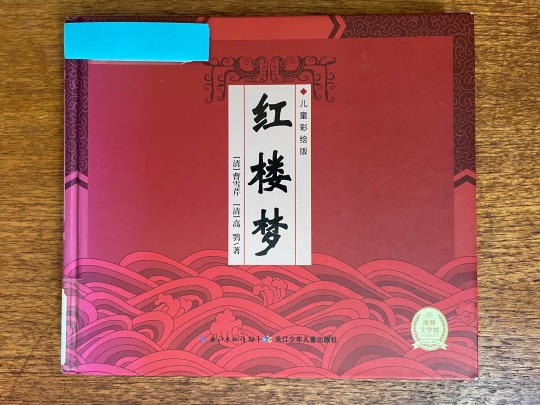
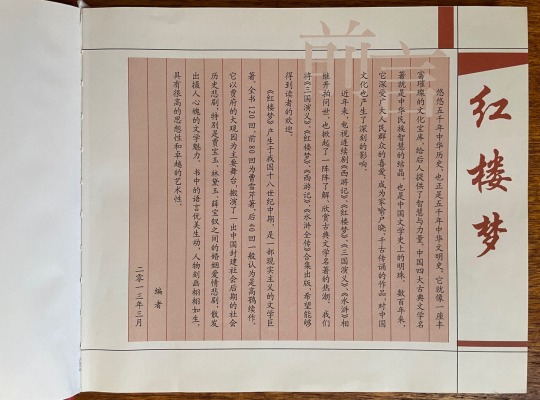
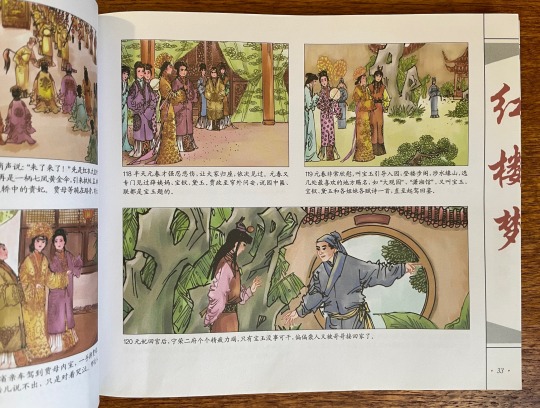
I came across this children’s illustrated version of 红楼梦 (Dream of the Red Chamber). Honestly it still looks pretty challenging to me 😬 There are a fair number of unfamiliar 汉字. But I’ll give it a shot!
#culture stuff#红楼梦#紅樓夢#honglou meng#hongloumeng#dream of the red chamber#langblr#language learning#mandarin chinese#studyblr#mandarin#chinese langblr#chinese#mandarin langblr#chinese language#learning languages
85 notes
·
View notes
Text
Exploring Chinese names of Taiwan

A while ago, I stumbled across this press release for Taiwan's National Names Statistical Analysis report. Then I clicked on the full report and spent days glued to my screen reading it!
So, courtesy of Taiwan's Ministry of the Interior, let's look at some of the data. We will look at: top given names, top full names, and top unisex names.
Format:
陈淑芬 | 陳淑芬 Chén Shūfēn | Chén Shúfēn / 3747人
简体 | 繁體 读音 | 台湾读音 / 人数
(Simp.) | (trad.) (pronunciation) | (Taiwan pronunciation) / (# people)
I put simplified first for consistency with the rest of my blog. 简体 | 繁體 is the convention I use in many other posts.
Top 10 given names (by decade)
The report shows the top names by decade, which is really fascinating because you can see how tastes and trends changed over time. I'm just going to show the overall top 10 and last three full decades (1990s, 2000s, and 2010s) but you can see the rest on pg. 280 of the report (pg. 281 of the PDF).
Male

Overall
家豪 Jiāháo / 14,038人
志明 Zhìmíng / 12,719人
建宏 Jiànhóng / 12,196人
俊杰 | 俊傑 Jùnjié / 12,187人
俊宏 Jùnhóng / 11,189人
志豪 Zhìháo / 10,676人
志伟 | 志偉 Zhìwěi / 10,563人
承翰 Chénghàn / 9726人
冠宇 Guànyǔ / 9655人
志强 | 志強 Zhìqiáng / 9101人
1991-2000
家豪 Jiāháo / 4039人
冠宇 Guànyǔ / 3603人
冠廷 Guàntíng / 3399人
承翰 Chénghàn / 3008人
宗翰 Zōnghàn / 2831人
柏翰 Bóhàn / 2594人
彦廷 | 彥廷 Yàntíng / 2502人
冠霖 Guànlín / 2114人
俊杰 | 俊傑 Jùnjié / 2084人
承恩 Chéng’ēn / 1918人
2001-2010
承恩 Chéng’ēn / 2997人
承翰 Chénghàn / 2636人
冠廷 Guàntíng / 2452人
冠宇 Guànyǔ / 2206人
宇翔 Yǔxiáng / 1938人
柏翰 Bóhàn / 1885人
彦廷 | 彥廷 Yàntíng / 1610人
冠霖 Guànlín / 1509人
柏宇 Bóyǔ / 1471人
柏谚 | 柏諺 Bóyàn / 1409人
2011-2020
承恩 Chéng’ēn / 2215人
宥廷 Yòutíng / 2036人
品睿 Pǐnruì / 2021人
宸睿 Chénruì / 1904人
宇恩 Yǔ’ēn / 1860人
宇翔 Yǔxiáng / 1713人
承翰 Chénghàn / 1556人
宥辰 Yòuchén / 1532人
柏睿 Bóruì / 1511人
睿恩 Ruì’ēn / 1503人
Female
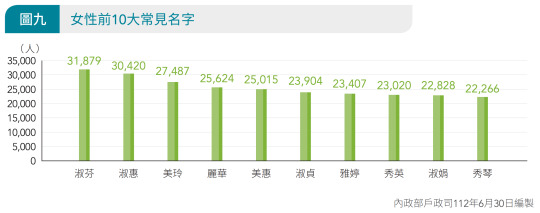
Overall
淑芬 Shūfēn | Shúfēn / 31,879人
淑惠 Shūhuì | Shúhuì / 30,420人
美玲 Měilíng / 27,487人
丽华 | 麗華 Lìhuá / 25,624人
美惠 Měihuì / 25,015人
淑贞 | 淑貞 Shūzhēn | Shúzhēn / 23,904人
雅婷 Yǎtíng / 23,407人
秀英 Xiùyīng / 23,020人
淑娟 Shūjuān | Shújuān / 22,828人
秀琴 Xiùqín / 22,266人
1991-2000
雅婷 Yǎtíng / 5797人
怡君 Yíjūn / 3575人
怡婷 Yítíng / 3183人
雅雯 Yǎwén / 3084人
诗涵 | 詩涵 Shīhán / 3006人
钰婷 | 鈺婷 Yùtíng / 2775人
怡萱 Yíxuān / 2729人
雅筑 Yǎzhù | Yǎzhú / 2700人
郁婷 Yùtíng / 2600人
宜庭 Yítíng / 2555人
2001-2010
宜蓁 Yízhēn / 2629人
欣妤 Xīnyú / 1643人
诗涵 | 詩涵 Shīhán / 1610人
思妤 Sīyú / 1561人
雅婷 Yǎtíng / 1439人
宜庭 Yítíng / 1394人
佳颖 | 佳穎 Jiāyǐng / 1375人
品妤 Pǐnyú / 1336人
子涵 Zǐhán / 1271人
怡萱 Yíxuān / 1258人
2011-2020
品妍 Pǐnyán/ 2421人
子晴 Zǐqíng / 2087人
咏晴 | 詠晴 Yǒngqíng / 2001人
品妤 Pǐnyú / 1697人
禹彤 Yǔtóng / 1578人
羽彤 Yǔtóng / 1434人
芯语 | 芯語 Xīnyǔ / 1342人
宥蓁 Yòuzhēn / 1226人
语彤 | 語彤 Yǔtóng / 1221人
苡晴 Yǐqíng / 1164人
Top 10 full names
In Mainland China the most common full names are usually something like 张伟 and 李娜. In Taiwan, 单名 (single-character given names) are much rarer, so the results are very different. We can also really see the dominance of the surname 陈 here. The rest of the top 100 are on pg. 268 of the report (pg. 269 of the PDF).
Male

陈冠宇 | 陳冠宇 Chén Guànyǔ / 4021人
陈建宏 | 陳建宏 Chén Jiànhóng / 3524人
张家豪 | 張家豪 Zhāng Jiāháo / 2890人
陈俊宏 | 陳俊宏 Chén Jùnhóng / 2801人
陈冠廷 | 陳冠廷 Chén Guàntíng / 2469人
陈柏宇 | 陳柏宇 Chén Bóyǔ / 2383人
林建宏 Lín Jiànhóng / 2375人
陈柏翰 | 陳柏翰 Chén Bóhàn / 2353人
陈彦廷 | 陳彥廷 Chén Yàntíng / 2249人
陈信宏 | 陳信宏 Chén Xìnhóng / 2120人
Female

陈怡君 | 陳怡君 Chén Yíjūn / 5744人
林怡君 Lín Yíjūn / 4401人
陈淑芬 | 陳淑芬 Chén Shūfēn | Chén Shúfēn / 3747人
张雅婷 | 張雅婷 Zhāng Yǎtíng / 3491人
陈美玲 | 陳美玲 Chén Měilíng / 3235人
陈怡如 | 陳怡如 Chén Yírú / 3121人
陈美惠 | 陳美惠 Chén Měihuì / 3103人
陈淑惠 | 陳淑惠 Chén Shūhuì | Chén Shúhuì / 2921人
林淑惠 Lín Shūhuì | Lín Shúhuì / 2903人
陈淑贞 | 陳淑貞 Chén Shūzhēn | Chén Shúzhēn / 2751人
Unisex/gender-neutral names

Do you want a name that doesn't strongly lean towards masculine or feminine? The report also highlight the common names across genders. It seems their criteria for this was names falling between 40% male-60% female and 60% male-40% female.
To clarify, they actually looked at the top 100 full names, not given names. For instance, 宥均 Yòujūn was on the list three times with three different surnames. But I re-sorted the list by given name since I was curious to see that. You can find the original data on pg. 270 of the report (pg. 271 of the PDF).
宥均 Yòujūn
Total: 1804人
Male: 54.77%
Female: 45.23%
佳霖 Jiālín
Total: 1111人
Male: 51.67%
Female: 48.33%
家华 | 家華 Jiāhuá
Total: 923人
Male: 53.41%
Female: 46.59%
郁文 Yùwén
Total: 847人
Male: 43.68%
Female: 56.32%
禹安 Yǔ’ān
Total: 789人
Male: 51.71%
Female: 48.29%
以恩 Yǐ’ēn
Total: 730人
Male: 49.32%
Female: 50.68%
孟儒 Mèngrú
Total: 643人
Male: 55.05%
Female: 44.95%
冠桦 | 冠樺 Guànhuà
Total: 643人
Male: 52.26%
Female: 47.74%
靖恩 Jìng’ēn
Total: 621人
Male: 44.93%
Female: 55.07%
品辰 Pǐnchén
Total: 600人
Male: 58.83%
Female: 41.17%
Notes
The report is INCREDIBLY detailed. I'm not kidding. The body of the report is not that long, but it has a very long appendix with about 200 pages of tables. Here are some examples of data included that I didn't mention:
Most popular given names people changed their names to
Most common 单名 and 叠字名字
Most common last names by city/county
Indigenous peoples' use of the Latin alphabet for names
Prevalence of multi-character surnames
And so, so much more!
And FYI, the report uses the ROC calendar, which starts with the founding of the Republic of China. To convert from the ROC calendar to the Gregorian calendar, add 111.
Ex:
1年=1912
112年=2023
Pronunciation & tones
冠 is a 多音字 that is pronounced guān or guàn. I went with guàn because that seems to be more common in names from what I've observed.
柏 is also a 多音字 that can be pronounced bǎi or bó. MDBG says Taiwan doesn't have the bǎi pronunciation. I usually hear it read as bó in names, so that's what I'm going with.
MDBG also says 淑 is pronounced shú (not shū) in Taiwan. Likewise, it says 筑 is zhú (not zhù). I'll take their word for it.
I tried to put apostrophes in the right places (like for 承恩 Chéng’ēn), but I'm really bad at knowing when and where to use it. Please pardon any mistakes!
See similar posts:
Chinese surnames that are more common in Taiwan
A closer look at Chinese names
Analyzing Chinese names: Syllables & tones
The evolution of Chinese names (Kontinentalist)
#chinese names#taiwan#chinese name#taiwanese names#taiwanese name#chinese#mandarin#mandarin chinese#chinese language#studyblr#langblr#learning languages#language learning#chinese langblr#mandarin langblr#languageblr
75 notes
·
View notes
Text
Fun fact: this blog was originally for Chinese and Russian. I don’t study Russian anymore (and have mostly forgotten it), but I’ll always remember a phrase my teacher taught us: понедельник – день тяжелый (ponedel'nik – den' tyazhelyy).
It means “Monday is a hard day,” and I think about it almost every Monday 😖
66 notes
·
View notes
Text
My 2023 in Mandopop/Chinese music (update & recs)

It’s been too long since I last shared some music recommendations/updates on what I’m listening to! Admittedly, I haven’t been discovering as many new artists because I’m busy listening to 薛之谦 on repeat. But we'll focus on the new.
You can check out my Spotify playlist featuring these songs (plus bonus ones). In addition, I’ve included YouTube links below.
五月天 / Mayday
五月天 is a legendary band, so of course I knew of them and had heard a few of their songs over the years. But I never proactively sought out their music until recently. I still haven’t had time to dive into their back catalog, but I’ve already found some songs I really love.
《我又初恋了》
I actually really didn’t like this song the first time I heard it, but it wormed its way into my brain. It’s just a lot of fun! Non-serious songs can be good too.
《转眼》
My favorite 五月天 song <3. I’m probably too young to fully appreciate the lyrics, but they make me feel so nostalgic and bittersweet, like transitioning to a new chapter of life and leaving the old behind.
《因为你 所以我》
This song didn’t stand out to me at first, but it grew on me! I caught myself humming it a lot. It‘s kind of corny, but it sounds so full of hope.
陈奕迅 / Eason Chan
I first started listening to 陈奕迅 a couple years ago after my Album a Day August challenge, but I’ve found that his music has grown on me over time. I believe I’ve only mentioned him once before, so I thought now was a good time to highlight my favorite of his songs.
《之外》
This is probably my favorite 陈奕迅 song. The lyrics convey a sense of hopelessness, but the overall song has a smooth, light sound.
《娱乐天空》
You know a song is good when it’s over 6 minutes long but feels like it flies by! It makes me want to get up, get moving, and be productive.
《烟味》
This song is dramatic, and I love it for that. Also has a hint of orchestral flavor.
《淘汰》
One of 陈奕迅’s most well-known songs—for a good reason. It has big Cpop ballad vibes but is definitely livelier.
白举纲 / Bai Jugang
You’re going to notice several mentions of 披荆斩棘 in this post. That’s where I “met” 白举纲. I instantly liked his voice and loved seeing him with his “brother” 高瀚宇 and “dad” 张晋! You may also see his music under his English name, Pax Congo.
《被动失控》
This is the only song on the list you could headbang to.
《Shy Boy》
I love this song because it’s cute and includes a children’s rhyme that I learned as a kid: 找啊找啊找朋友 找到一个好朋友.
苏诗丁 / Su Shiding
At some point last year I did a one-month free trial of Apple Music. It was an interesting experience because the recommendations were very different from what Spotify tends to show me. I’m glad Apple Music led me to 苏诗丁!
《LUCIFER(傲慢宗罪)》
All I can say is that this song exudes coolness and confidence. It also has a fair bit of English, but honestly I had to look up the lyrics to tell what some of it was.
《梦幻病》
This song is from the same album. It’s dreamlike but gets more frantic as it builds. Overall, it’s just a bit…unsettling.
队长 / Young Captain
I learned about 队长 from a random post on Instagram about his concert in Malaysia. I think these songs might have gone viral on 抖音 or something. I was surprised I liked them so much because they both have some rap (I’m not a rap fan), but it was love at first listen.
《11》
I love how this song builds towards the end. I spend the whole song waiting for the crescendo, and it’s great payoff.
《楼顶上的小斑鸠》
This song is like the slightly mellower sibling of the one above. But I ended up liking this one even more.
金志文 / Jin Zhiwen
金志文 was another artist who Apple Music recommended to me. I definitely need to explore his discography more but haven’t had the chance to do so yet. But he has some good stuff so far!
《自娱自乐》
Smooth and relaxing but in a fun way. Simple and no-frills but will put a smile on your face!
《远走高飞》
This one feels like enjoying the breeze on a beautiful sunny day. I also enjoy the duet with 徐佳莹 version.
163braces
163braces started out as a YouTuber posting song covers. I have watched a couple of her covers, but they didn’t leave much of an impression on me. I was pleasantly surprised by her foray into original music. I look forward to hearing what she does next!
《控制》
The song I would want as my “soundtrack” if I were a video game character. It’s energetic and loud.
《murmur》
Honestly this song is pretty similar to the first one. Sometimes I have trouble distinguishing them. But hey, if ain’t broke, don’t fix it.
小鬼 / Lil Ghost
小鬼 did what I can best describe as “pulling an MGK” by going from more rap to kinda pop-punk? That MGK album was my guilty pleasure when in came out, so I’m all for 小鬼’s new direction.
《Last Day》
This song really gave me MGK vibes. It’s about half in English, but I often don't even notice when he switches between languages.
《不良少年》
I just know I would have loved this song so much in high school. It’s an angsty teen anthem.
《为明天写封信》
I can totally imagine this song playing at the end of a 2000s teen movie! Maybe while showing a montage of the main characters graduating.
《无所求必满载而归》 by 陈粒 / Chen Li
This is technically cheating because I have recommended 陈粒 songs before, but it was at least a couple years ago. I heard this song covered on 披荆斩棘的哥哥 and immediately looked up the original. Honestly I should have known it was a 陈粒 song because you can totally tell it’s her style.
《轻红》 by 曹杨 / Young
I keep coming back to this song! It’s from a drama soundtrack. I was super surprised the first time I listened to it because I thought it was going to be a typical ballad based on the first ~45 seconds or so—it wasn’t. There is also another version by 陈雪燃 (the king of cdrama OSTs). But I actually prefer the 曹杨 version.
《时光机》 by 吴克群 / Kenji Wu
I was introduced to 吴克群 via 披荆斩棘2. He was instantly one of my favorite contestants after his team’s amazing 《新地球》 performance (check it out). This song is bouncy and a little dreamy. I kinda want to hear a remix with Harry Styles’ As It Was. I just wish it were longer than 3 minutes!
My Spotify Wrapped
I have a tradition of sharing my Spotify Wrapped, and I wanted to continue the streak in some form. So here's a quick rundown.
Top genre: 华语流行音乐
Representative city: Taipei
Minutes: 21,750
Top artists
薛之谦 / Xue Zhiqian
林宥嘉 / Yoga Lin
五月天 / Mayday
李荣浩 / Li Ronghao
陈奕迅 / Eason Chan
Top songs
《木偶人》 - 薛之谦
《狐狸》 - 薛之谦
《骆驼》 - 薛之谦
《转眼》 - 五月天
《后来的我们》 - 五月天
Also, fellow Mandopop fans should check out the Mando Gap newsletter. I stumbled upon it this year, and I know it’s going to be a great resource for discovering new artists in 2024!
#chinese music recs#cpop#c-pop#c pop#mandopop#chinese music#chinese#mandarin#mandarin chinese#chinese language#studyblr#langblr#learning languages#language learning#chinese langblr#mandarin langblr#languageblr
177 notes
·
View notes
Text
My trip to Taiwan
I took a break from posting because...I went to Taiwan! This was my first time going there, and I was mostly in Taipei. I had a great time and took many, many photos. I'll share some highlights here (along with commentary) to commemorate my trip.
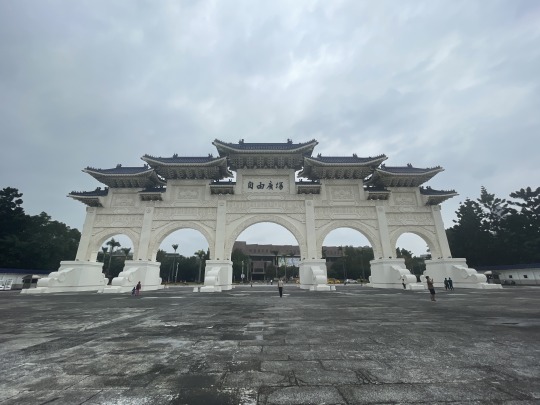

Left: Liberty Square 自由廣場
Right: Chiang Kai-shek Memorial 中正紀念堂
You can't tell here, but there was a row of porta-potties directly to the left of the archway. That was a funny sight. There was also a stage in the middle of the square. Maybe they do outdoor concerts?

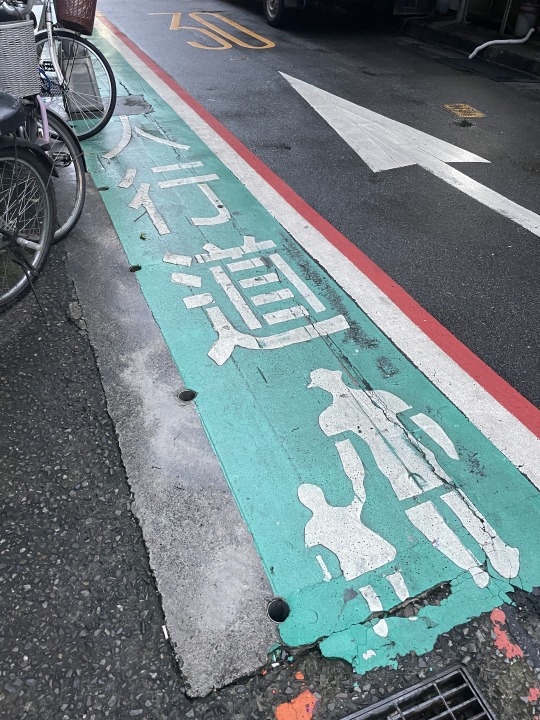
Left: Tamsui Old Street 淡水老街
Right: "Sidewalk"
Besides the main roads, most streets lacked raised sidewalks. Instead, they had a painted path. I had to get comfortable being very, very close to cars and other vehicles.

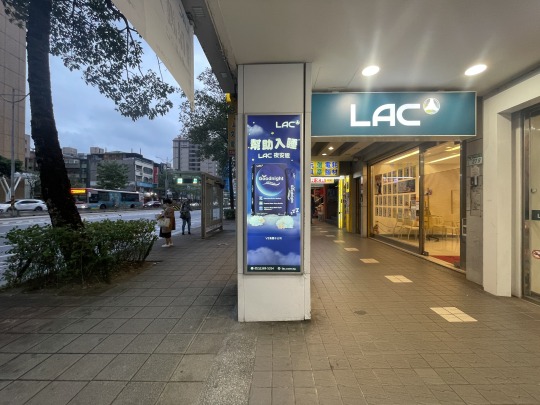
Left: Motorbike parking lot near Tamsui Old Street
Right: Covered sidewalk.
I’ve seen motorbikes before in China, but Taipei took things to a new level. Motorbikes were absolutely everywhere. I even saw this parking lot exclusively for motorbikes. They rule the streets.
In the busy downtown districts, you often don’t need an umbrella due to the covered sidewalks. You can walk for blocks and blocks while staying covered. This was pretty convenient on rainy days.
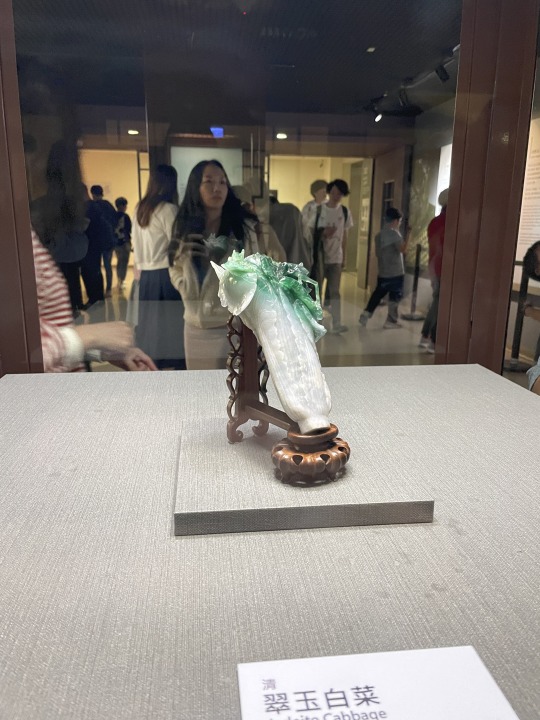
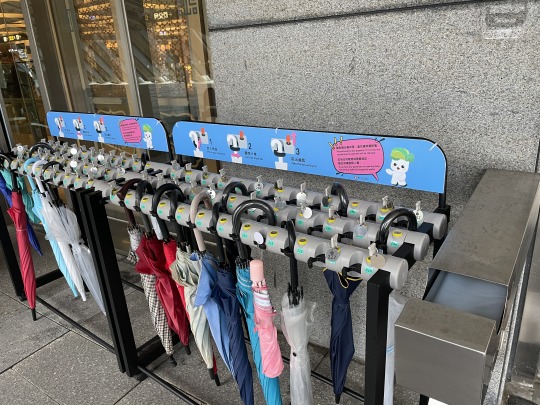
Left: Jadeite Cabbage 翠玉白菜 at the National Palace Museum 國立故宮博物院
Right: Umbrella rack (also at the museum)
Confession—I didn't think the National Palace Museum was that good. Probably because I've been to the actual Forbidden City in Beijing. And sadly, the Meat-Shaped Stone wasn't on exhibit.
In the US, some stores will provide a plastic bag for your wet umbrella. In Taipei, many stores had a rack or basket outside instead. Most were not as secure or elaborate as the one pictured.


Left: Eslite Xinyi Store (bookstore) 誠品信義店
Right: Sun Yat-sen Memorial 國父紀念館
I bought a couple books and a Yoga Lin CD at the Eslite 24-hour bookstore. I only planned to swing by, but I think I spent 2 hours there. I definitely recommend checking it out if you're in Taipei.


Taipei 101 台北101
It was overcast when I went to Taipei 101, but the view was still nice. On the bright side, there was NO line. 101 is by far the tallest building around, so you really feel that you're looking down at the city.


Taroko National Park 太魯閣國家公園
Taroko was the only place I visited outside of the Taipei/New Taipei City area. It's in Hualien county on the east coast. There were so many betel nut stores in the countryside on the way there.
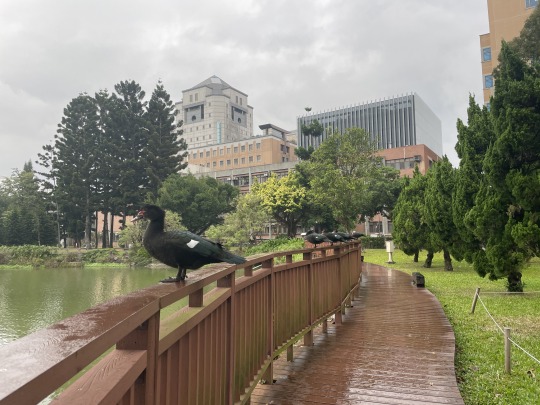
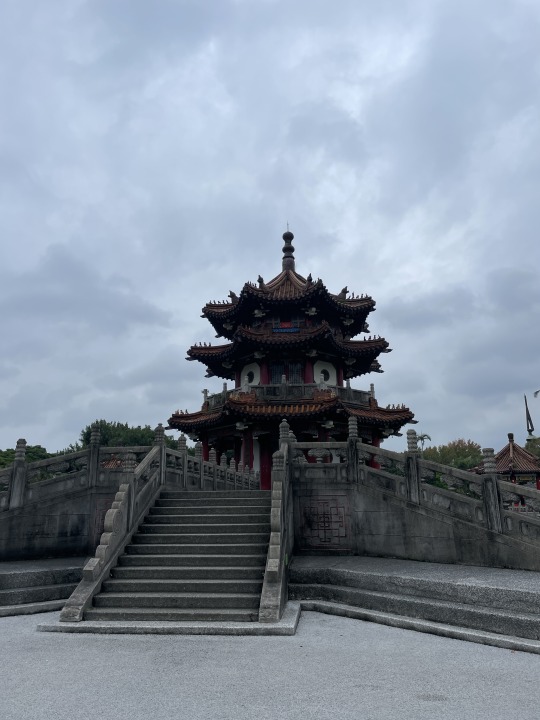
Left: Pond at NTU 國立臺灣大學
Right: 228 Peace Memorial Park 二二八和平紀念公園
Taipei has the best parks! They really put American parks to shame. Before going, I didn't understand why so many Taipei parks are tourist destinations with 4.5+ star reviews, but now I totally get it.
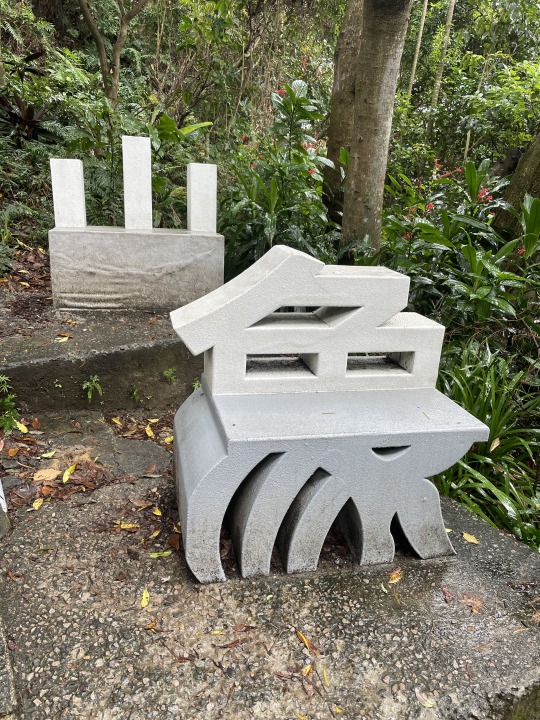
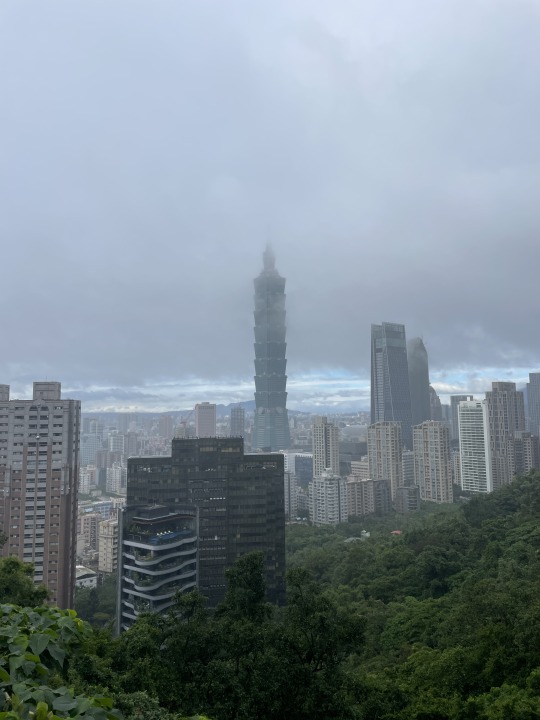
Elephant Mountain 象山
I didn’t realize how mountainous Taiwan is. Taipei is cradled by mountains, so there are many places to hike, even within city limits. I braved the rain for the famous view from Elephant Mountain.


Subway billboard 臺北捷運
The Taipei Metro/MRT was amazing. So fast, clean, frequent, and convenient. US subway systems are a joke in comparison. These are from an amusing series of billboards promoting riding etiquette.
Some other observations:
I was quite impressed by all of the English signage in Taipei. I think it would be very easy to navigate even if you don’t know Chinese. Many stores and small eateries had menus, signs, etc. in English.
I knew Taiwan had many convenience stores, but I was not prepared to see a Family Mart or 7/11 on every block. Someone needs to open this style convenience store in the US ASAP.
I saw numerous adds featuring Korean actors like Son Ye-jin and also kpop groups like IVE and NewJeans. I also heard kpop playing at various stores, whereas in America, I only hear it at Hmart.
I was struck by how many street signs and subway stops names used pinyin romanization. There was a lot of inconsistency and mixing of different romanization systems. For example, you have Taipei vs. Beitou (same character: 北).
There were many Japanese stores, pharmacies, and restaurants. Upon further consideration, this makes sense given Taiwan's history, but it stood out to me nonetheless.
Overall, I had a lovely time in (mostly) Taipei. As a big city (but not too big) surrounded by beautiful nature, there's something for everyone. I already want to go back! Of course I also want to see some other areas of Taiwan too. Maybe next year.
85 notes
·
View notes
Text
75 essential single-character adjectives (单字形容词)
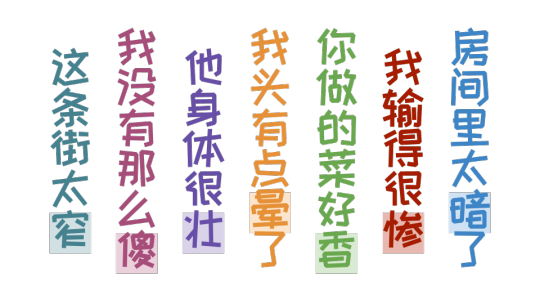
This is somewhat of a follow-up to two previous posts on verbs:
75 essential single-character verbs (单字动词)
75 more essential single-character verbs (单字动词)
I always intended to make a post on adjectives, but it took me longer than expected to gather, sort, and filter through my list of adjectives. And I decided to add examples this time, which took even more time.
I learned many of these simply from consuming native content (mostly TV shows) over the past 2-3 years. It's the kind of stuff you probably won't find in your textbook. So please enjoy~
(1) 脏 | 髒 zāng - dirty / filthy
Ex: 别把衣服弄脏了。
(2) 乖 guāi - (of a child) obedient / well-behaved / clever
Ex: 小宝贝真乖!
(3) 软 | 軟 ruǎn - soft / flexible
Ex: 被子很软
Ex: 皮肤软软的
(4) 湿 | 濕 shī - moist / wet
Ex: 穿湿衣服
(5) 红 | 紅 hóng - popular
Ex: 这首歌最近很红。
(6) 痒 | 癢 yǎng - itchy
Ex: 皮肤很痒
(7) 细 | 細 xì - thin or slender / fine / delicate
Ex: 她的腿又长又细。
(8) 绝 | 絕 jué - superb / awesome
Ex: 身材很绝
Ex: 他的表演真是太绝了。
(9) 窄 zhǎi - narrow / narrow-minded
Ex: 这条街太窄。
(10) 慌 huāng - panicky / flurried / flustered
Ex: 别慌!
(11) 疯 | 瘋 fēng - insane / mad / wild
Ex: 车开这么快,简直疯了!
(12) 硬 yìng - hard / stiff
Ex: 床垫太硬
(13) 麻 má - tingling / numb
Ex: 胳膊枕一会儿就麻了。
(14) 烫 | 燙 tàng - scalding hot
Ex: 烫水
Ex: 额头好烫,一定发烧了。
(15) 凉 | 涼 liáng - cool / cold / discouraged / disappointed
Ex: 天气转凉
Ex: 他的话让他父母心凉。
(16) 怂 | 慫 sǒng - timid / cowardly
Ex: 自己特别怂
(17) 腻 | 膩 nì - greasy
Ex: 汤有点腻
(18) 惨 | 慘 cǎn - miserable / wretched / disastrous / tragic
Ex: 我输得很惨。
(19) 凶 | 兇 xiōng - vicious / fierce
Ex: 很凶的样子
(20) 蠢 chǔn - stupid / foolish
Ex: 你怎么这么蠢?
(21) 狠 hěn - ruthless / fierce / ferocious
Ex: 他的心真狠。
(22) 暗 àn - dark
Ex: 房间里太暗了。
(23) 歪 wāi - askew / crooked
Ex: 这幅画挂歪了。
(24) 稳 | 穩 wěn - settled / steady / stable
Ex: 坐稳扶好
(25) 晕 | 暈 yūn - dizzy / giddy
Ex: 我头有点晕了。
(26) 搭 dā - matching / complementary
Ex: 衣服与人很搭
(27) 妙 miào - clever / wonderful
Ex: 情况不妙
(28) 土 tǔ - unsophisticated / rustic / country bumpkin
Ex: 口音很土
Ex: 很土的衣服
(29) 浓 | 濃 nóng - concentrated / dense / strong (smell etc)
Ex: 雾很浓
Ex: 咖啡太浓
(30) 烂 | 爛 làn - crappy / bad
Ex: 我的中文很烂。
(31) 宽 | 寬 kuān - wide / broad
Ex: 河很宽
Ex: 肩膀很宽
(32) 糟 zāo - rotten / messy / ruined / poor
Ex: 把事情搞糟了
(33) 嗨 hāi - high (natural or drug-induced)
Ex: 玩得很嗨
(34) 齐 | 齊 qí - neat / even / level / complete
Ex: 很齐的舞蹈
Ex: 人到齐了没有?
(35) 巧 qiǎo - opportune / coincidental
Ex: 真巧,你也来了。
(36) 破 pò - broken / damaged / worn out / lousy / rotten
Ex: 破衣服
Ex: 我讨厌这个破地方。
(37) 黑 hēi - dark / tan
Ex: 晒黑了
Ex: 黑皮肤
(38) 丧 | 喪 sàng - disappointed / discouraged
Ex: 心情很丧
(39) 松 | 鬆 sōng - loose / relaxed
Ex: 带子太松
(40) 壮 | 壯 zhuàng - strong / robust
Ex: 他身体很壮。
(41) 臭 chòu - foul / smelly
Ex: 臭鸡蛋
Ex: 这地方怎么这么臭。
(42) 爽 shuǎng - feeling well or good / awesome / refreshed
Ex: 心情不爽
(43) 顺 | 順 shùn - smooth / successful
Ex: 日子过得挺顺
Ex: 中文讲得很顺
(44) 润 | 潤 rùn - moist / glossy / sleek
Ex: 头发润润的
(45) 弱 ruò - weak / feeble
Ex: 我的能力比她弱。
(46) 蒙 mēng - dazed / stunned
Ex: 我一上台就蒙了。
(47) 聋 | 聾 lóng - deaf
Ex: 耳朵完全聋了。
(48) 脆 cuì - brittle / fragile / crisp / crunchy
Ex: 饼干很脆
(49) 滑 huá - slippery / smooth
Ex: 雨后路滑
(50) 火 huǒ - hot / popular
Ex: 生意很火
Ex: 最近很火的一首歌曲
(51) 香 xiāng - fragrant / aromatic
Ex: 你做的菜好香。
(52) 亮 liàng - bright / light
Ex: 星星越来越亮。
(53) 笨 bèn - stupid / foolish / silly / slow-witted / clumsy
Ex: 笨小孩
Ex: 我的手太笨。
(54) 闷 | 悶 mēn - stuffy (air or weather)
Ex: 屋里太闷了。
(55) 烦 | 煩 fán - annoyed / bothered / troublesome / annoying
Ex: 我妹妹一直让我很烦。
(56) 傻 shǎ - foolish
Ex: 我没有那么傻。
(57) 迟 | 遲 chí - late / delayed / slow
Ex: 对不起,来迟了。
(58) 急 jí - urgent / pressing / rapid / hurried / worried
Ex: 事情很急,必须马上处理。
(59) 懒 | 懶 lǎn - lazy
Ex: 我变懒了。
(60) 厚 hòu - thick
Ex: 这本书真厚。
(61) 呆 dāi - foolish / stupid / expressionless / blank
Ex: 呆呆地看着
(62) 密 mì - close / thick / dense
Ex: 雨点越来越密。
(63) 丑 | 醜 chǒu - ugly
Ex: 长得丑
(64) 沙 shā - hoarse / raspy
Ex: 喊得声音都有点沙了
(65) 困 | 睏 kùn - sleepy / tired
Ex: 我困得眼睛都睁不开了。
(66) 酸 suān - sour / grieved / sore / aching / mean / bitter
Ex: 酸牛奶
Ex: 腰酸背痛
Ex: 网友的评论酸极了。
(67) 严 | 嚴 yán - stern / strict / rigorous / severe
Ex: 要求很严
(68) 干 | 乾 gān - dry
Ex: 擦干眼泪
Ex: 衣服还没晒干。
(69) 尖 jiān - sharp / shrill / piercing / keen
Ex: 尖刺
Ex: 他的眼睛很尖。
(70) 广 | 廣 guǎng - wide / vast / broad
Ex: 范围很广
(71) 平 píng - flat / level / equal
Ex: 马路不平
(72) 哑 | 啞 yǎ - (of a voice) hoarse / husky
Ex: 嗓子哑了
(73) 沉 chén - deep / profound / heavy
Ex: 睡得很沉
Ex: 头沉得抬不起来
(74) 狂 kuáng - mad / wild / violent
Ex: 猫咪的狂叫
(75) 牛 niú - awesome
Ex: 这实力是真的牛!
Definitions are adapted from MDBG. Most examples are taken from 现代汉语规范词典 via Pleco, others are taken from my brain.
#vocab list#chinese#mandarin#mandarin chinese#chinese language#studyblr#langblr#learning languages#language learning#chinese langblr#mandarin langblr#languageblr
160 notes
·
View notes
Text
15 grammar points (语法点) I wish I learned sooner
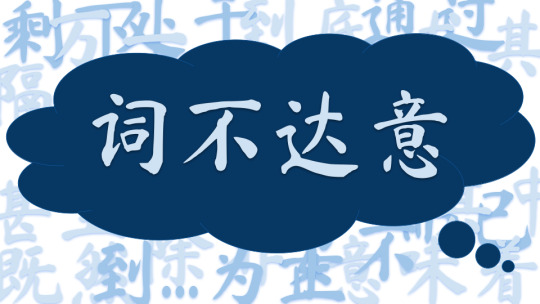
At my current level of Chinese, my biggest struggle is 词不达意 (cíbùdáyì, literally words don't convey meaning). It means poorly expressed or inarticulate. Basically, I know enough to convey my message but am often unable to do so succinctly and articulately.
Today I'm sharing 15 words/expressions that I feel really boost my ability to express myself articulately. I use them all the time and wish I had known them sooner. I hope they will be of use to you too!
(1) 万一 | 萬一 wànyī - just in case / if by any chance / contingency
Ex: 万一我来不了,你就替我出席。
(2) 甚至 shènzhì - even / so much so that
Ex: 他忙得甚至连吃饭时间都没有。
(3) 到底 dàodǐ - finally / in the end / when all is said and done / after all / to the end / to the last
Ex: 他到底想要什么?
Ex: 我们一定要坚持到底,不能半途而废。
(4) 要不 yàobù - otherwise / or else / how about...?
Ex: 快点起床了,要不就会迟到了。
Ex: 要不我们先坐下再想想办法吧。
(5) 而已 éryǐ - that's all / nothing more
Ex: 我开玩笑而已,何必那么认真?
(6) 既然 jìrán - since / as / this being the case
Ex: 你既然不想参加这次聚会,那就别去了。
(7) 除非 chúfēi - only if (..., or otherwise, ...) / only when / only in the case that / unless
Ex: 除非大家都去,否则我不去。
Ex: 除非你去邀请,他才愿意出席。
(8) 处于 | 處於 chǔyú - to be in (some state, position, or condition)
Ex: 病人的状况一直不稳定,还处于危险中。
(9) 通过 | 通過 tōngguò - by means of / through / via
Ex: 很多人都想要通过看中剧提高中文水平。
Ex: 通过爸爸的帮助,我克服了害怕和紧张。
(10) 尤其 yóuqí - especially / particularly
Ex: 为了完成这份工作,大家都很努力,尤其是她。
(11) 其中 qízhōng - among / in / included among these
Ex: 我们班有十个学生,其中女生占百分之六十。
(12) 剩下 shèngxià - to remain / left over
Ex: 放学后,同学都走光了,只剩下他一个人在教室里。
(13) 到…为止 | 到…為止 dào...wéizhǐ - until / up to
Ex: 今天的讨论到此为止。
Ex: 到目前为止,这项活动只有十个人报名参加。
(14) 意味着 | 意味著 yìwèizhe - to mean / to imply
Ex: 树叶开始凋落,意味着冬天的到来。
(15) 隔 gé - after or at an interval of
Ex: 每隔十分钟开出一列火车。
Ex: 我们们每隔一天上一次中文课。
Happy Halloween tomorrow! 🎃👻🐈⬛
See similar posts:
20 measure words (量词) I wish I learned sooner
7 intermediate/advanced Chinese grammar fundamentals
#my learning#chinese grammar#chinese#mandarin#mandarin chinese#chinese language#studyblr#langblr#learning languages#language learning#chinese langblr#mandarin langblr#languageblr
377 notes
·
View notes
Text
When you don't recognize a familiar character
Due to different fonts, styles, and variants, sometimes it's hard to recognize a character that you thought you knew well. I collected 3 examples that I've personally encountered online. Let's take a look~
Below, the character in the blue bubble shows what I'm used to seeing.
令 lìng

If you look at Wiktionary, you will see that there are a few different styles/versions of the character 令. For instance, you may see the top with a 丶 (点, the dot stroke) or a longer, flat line. But what really threw me off here was the bottom half, which looks quite different here from what I am used to.
灰 huī
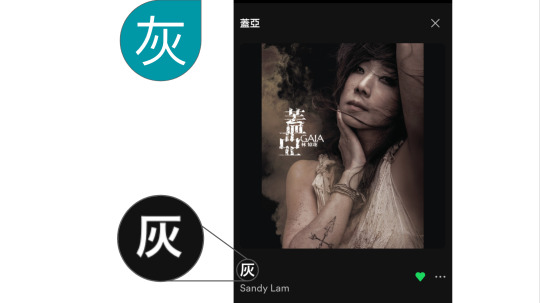
I was so confused by the name of this Sandy Lam song on Spotify. I drew it in Pleco, but I didn't get any matches. I thought maybe it was 灭 miè. Eventually I looked up the album tracklist and learned it's 灰. Wiktionary seems to say this is the Japanese variant of 灰, but I think it comes down to the font Spotify uses.
真 zhēn

Despite 眞 and 真 looking quite different, I actually didn't have much difficulty reading 眞 due to context. MDBG lists it as a variant of 真. This video was on Instagram, but I think it's reposted from 抖音 (Douyin). I see 眞 on a lot of 抖音 reposts, so I assume it's due to the font used on 抖音.
#my learning#nerdy language stuff#chinese#mandarin#mandarin chinese#chinese language#studyblr#langblr#learning languages#language learning#chinese langblr#mandarin langblr#languageblr#chinese characters#hanzi
102 notes
·
View notes
Note
Any tips for how to prepare for HSK 6 writing part? 😊
Sorry, I have never taken any HSK exams. I don’t know anything about the writing part.
3 notes
·
View notes